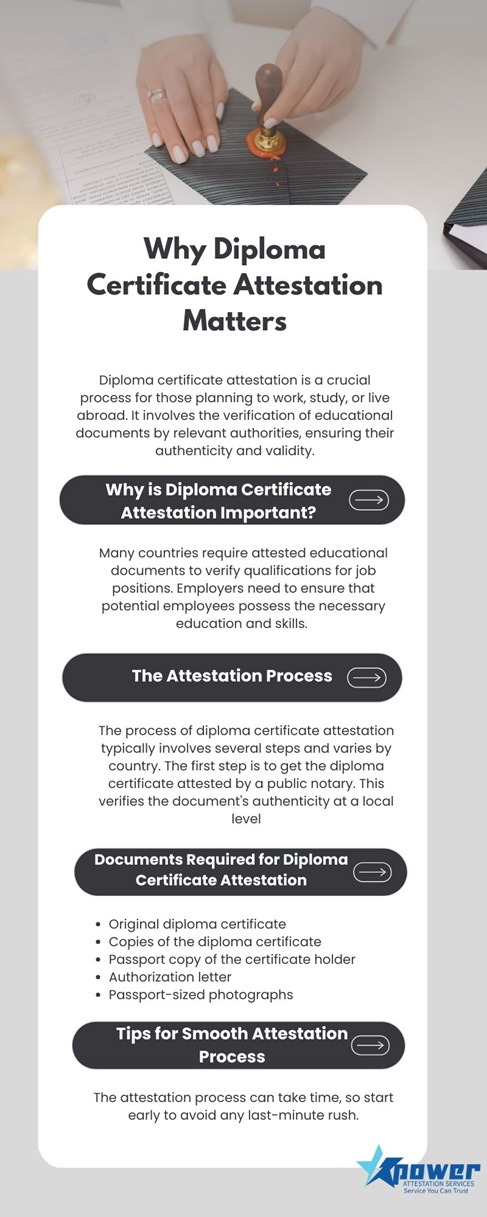Discussions
Why Diploma Certificate Attestation Matters

Introduction
Diploma certificate attestation is a crucial process for those planning to work, study, or live abroad. It involves the verification of educational documents by relevant authorities, ensuring their authenticity and validity. This attestation process makes your documents legally acceptable in foreign countries, facilitating various procedures such as employment, higher education, visa applications, and professional licensing.
When you present your educational qualifications in another country, the authorities need assurance that your documents are genuine and issued by recognized institutions. This is where attestation comes into play. By going through the attestation process, you provide the necessary proof that your diploma certificate is legitimate, thus avoiding potential issues or rejections.
The importance of diploma certificate attestation cannot be overstated. Employers, educational institutions, and immigration authorities in foreign countries rely on attested documents to make informed decisions. Without proper attestation, your documents might not be accepted, leading to delays or denial of your applications.
This guide will walk you through the attestation process, its significance, and the detailed steps involved. From the initial notary attestation to the final embassy attestation, each stage plays a vital role in ensuring that your diploma certificate is recognized and accepted abroad. Understanding this process will help you prepare adequately, ensuring a smooth transition to your new international endeavors.
Why is Diploma Certificate Attestation Important?
-
Employment Opportunities: Many countries require attested educational documents to verify qualifications for job positions. Employers need to ensure that potential employees possess the necessary education and skills. Attested diploma certificates provide a trustworthy validation of your credentials, making you a competitive candidate in the job market. Without attestation, employers might question the legitimacy of your qualifications, potentially hindering your chances of securing employment.
-
Higher Education: Universities and educational institutions abroad often require attested certificates for admission purposes. This ensures that your previous educational achievements are recognized and accepted. Attestation verifies that your diploma is authentic and issued by a legitimate institution, which is crucial for universities when assessing your eligibility for their programs. This process helps maintain the integrity of academic admissions and ensures that all students meet the required educational standards.
-
Immigration and Visa: Attested documents are often needed for obtaining work visas or residence permits. Immigration authorities require proof of your educational qualifications to grant visas, especially if you are applying for skilled worker programs or other visa categories that necessitate specific educational backgrounds. Attested certificates streamline the visa application process, providing immigration officers with the assurance that your educational documents are valid and credible. This can expedite the processing of your visa application and reduce the risk of rejection.
-
Professional Licensing: Certain professions, such as medicine, engineering, and law, require verified credentials before issuing licenses to practice. Professional licensing bodies need to confirm that you have the necessary education and training to perform your duties safely and competently. Attested diploma certificates serve as a reliable proof of your qualifications, allowing you to obtain the necessary licenses and certifications to practice your profession legally. This is particularly important in regulated fields where public safety and professional standards are paramount.

Additional Reasons for Diploma Certificate Attestation:
-
Permanent Residency Applications: For those seeking permanent residency in a foreign country, attested educational documents are often part of the required documentation. Authorities need to verify your qualifications to determine your eligibility for residency programs. Having attested documents can significantly enhance your application, demonstrating that you meet the educational criteria set by the immigration authorities.
-
Government and Legal Requirements: In some countries, certain government positions or legal processes may require attested educational documents. This can include applying for government jobs, participating in legal proceedings, or fulfilling specific regulatory requirements. Attestation ensures that your educational qualifications are formally recognized and accepted in these contexts.
-
Recognition of Foreign Qualifications: If you obtained your diploma from an institution outside your home country, attestation is crucial for recognition. It helps in validating foreign qualifications, ensuring they are equivalent to the local standards. This is especially important for those who studied abroad and are returning to their home country or moving to a new country where they need their foreign education to be recognized.
-
Professional Growth and Mobility: Attested diploma certificates can enhance your professional growth and mobility. Whether you are seeking international job opportunities, promotions, or transfers within multinational companies, having attested documents can facilitate these processes. Employers value employees with validated qualifications, making you a more attractive candidate for career advancement.
The Attestation Process
The process of diploma certificate attestation typically involves several steps and varies by country. Here is a general overview:
- Notary Attestation: The first step is to get the diploma certificate attested by a public notary. This verifies the document's authenticity at a local level.
- Home Department Attestation: The certificate is then sent to the Home Department of the state where the diploma was issued. This ensures that the document is genuine and was issued by a recognized educational institution.
- Ministry of External Affairs (MEA) Attestation: The Home Department-attested certificate is forwarded to the Ministry of External Affairs. The MEA verifies and attests the document, making it eligible for use internationally.
- Embassy or Consulate Attestation: The final step is to get the diploma certificate attested by the embassy or consulate of the country where you intend to use it. This attestation confirms that the document meets the foreign country's requirements.

Documents Required for Diploma Certificate Attestation
- Original diploma certificate
- Copies of the diploma certificate
- Passport copy of the certificate holder
- Authorization letter (if using an attestation service)
- Passport-sized photographs (as per requirement)
Tips for Smooth Attestation Process
- Start Early: The attestation process can take time, so start early to avoid any last-minute rush.
- Use Professional Services: Consider using professional attestation services to streamline the process and avoid complications.
- Check Requirements: Different countries have different attestation requirements. Ensure you check the specific requirements of the country where you plan to use the document.
- Keep Copies: Always keep multiple copies of your attested diploma for future use.
Conclusion
Diploma certificate attestation in UAE is an essential process for anyone planning to study, work, or live abroad. Understanding the steps and requirements involved can help you navigate the process smoothly. Whether you're doing it yourself or using a professional service, ensuring your documents are properly attested will save you time and hassle in the long run.
